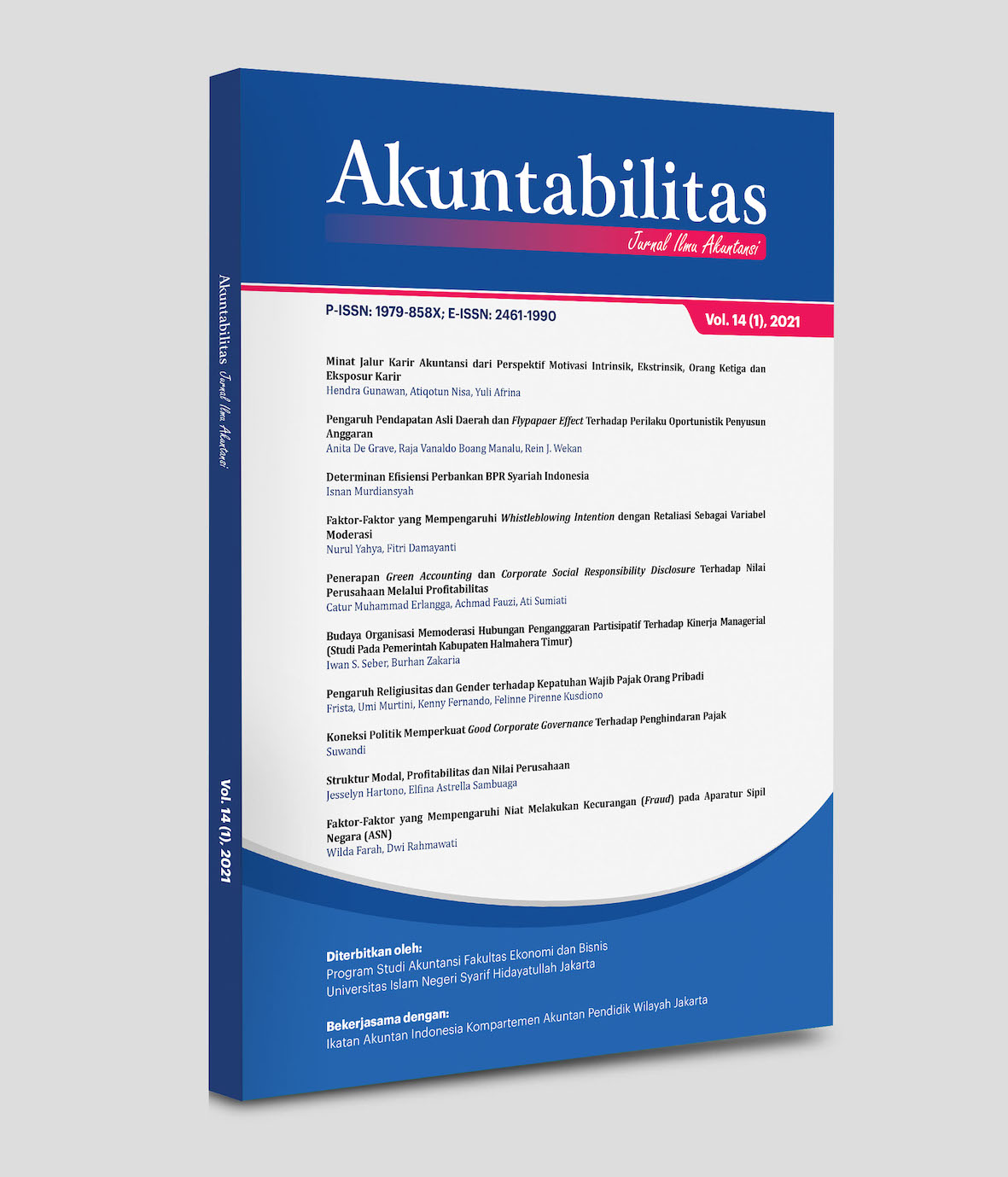Pengaruh Religiusitas dan Gender terhadap Kepatuhan Wajib Pajak Orang Pribadi
DOI:
https://doi.org/10.15408/akt.v14i1.19330Keywords:
religiosity, gender, tax compliance, religious leaderAbstract
One of the problems faced by Indonesia is the low level of the tax ratio. In order to increase state revenue from the tax sector, efforts should be made to increase voluntary tax compliance. This study aims to examine the effect of religiosity and gender on tax compliance. The method used is quantitative “mix methods” using regression analysis and descriptive analysis of the questionnaire obtained through “convenience sampling methods”. The results showed that religiosity and gender had a positive effect on tax compliance. The higher the level of religiosity, the level of taxpayer compliance will also increase. This research contributes to providing input to tax authorities to increase tax awareness through outreach in religious communities by involving women.
References
Alm, J., & Torgler, B. (2006). Culture differences and tax morale in the United States and in Europe. Journal of Economic Psychology, 27(2), 224–246. https://doi.org/10.1016/j.joep.2005.09.002
Andhika Utama dan Dudi wahyudi. (2016). Pengaruh Religiusitas terhadap Perilaku Kepatuhan Wajib Pajak Orang Pribadi di Provinsi DKI Jakarta. Jurnal Lingkar Widyaiswara, Edisi. 3 N(2), 1–13.
Benk, S., Budak, T., Yüzba, B., & Mohdali, R. (2016). The Impact of Religiosity on Tax Compliance among Turkish Self-Employed Taxpayers. Religions, 7(4), 37. https://doi.org/10.3390/rel7040037
Boone, J. P., Khurana, I. K., & Raman, K. K. (2013). Religiosity and tax avoidance. Journal of the American Taxation Association, 35(1), 53–84. https://doi.org/10.2308/atax-50341
Budiarto, D. S., Yennisa, Y., & Widyaningrum, R. (2018). Does Religiosity Improve Tax Compliance? An empirical research based from gender. Jurnal Dinamika Akuntansi, 10(1), 82–90. https://doi.org/10.15294/jda.v10i1.12997
Cahyonowati, N. (2011). Model Moral dan Kepatuhan Perpajakan: Wajib Pajak Orang pribadi. Jaai, 15(Desember), 161–177.
Cyan, M. R., Koumpias, A. M., & Martinez-Vazquez, J. (2016). The determinants of tax morale in Pakistan. Journal of Asian Economics, 47, 23–34. https://doi.org/10.1016/j.asieco.2016.09.002
Devano, S., & Siti Rahayu, K. (2006). Perpajakan: konsep, teori, dan isu. In 1. PAJAK DAN PERPAJAKAN,Perpajakan: konsep, teori, dan isu / Sony Devano, Siti Kurnia Rahayu.
Etienne, J. (2011). Compliance theory: A goal framing approach. Law and Policy, 33(3), 305–333. https://doi.org/10.1111/j.1467-9930.2011.00340.x
Fischer, C. M., Wartick, M., & Mark, M. M. (1992). Detection probability and taxpayer compliance: A review of the literature. Journal of Accounting Literature, 11, 1. http://proquest.umi.com/pqdlink?did=7572992&Fmt=7&clientId=36305&RQT=309&VName=PQD%5Cnhttp://www.mendeley.com/research/detection-probability-and-taxpayer-compliance-a-review-of-the-literature/
Ghani, H., Hamid, N. A., Sanusi, S., Shamsuddin, R., & Author, C. (2020). The Effect of Tax Knowledge , Compliance Costs , Complexity and Morale Towards Tax Compliance Among Self-Employed in Malaysia. Global Business and Management Research: An International Journal, 12(1), 18–32.
Ghozali, I. (2018). Aplikasi Analisis Multivariate Dengan Program IBM dan SPSS. In Aplikasi Analisis Multivariate Dengan Program Ibm Spss 19. Badan Penerbit Universitas Diponegoro.
Horodnic, I. A. (2018). Tax morale and institutional theory: a systematic review. International Journal of Sociology and Social Policy, 38(9–10), 868–886. https://doi.org/10.1108/IJSSP-03-2018-0039
Inasius, F. (2019). Factors Influencing SME Tax Compliance: Evidence from Indonesia. International Journal of Public Administration, 42(5), 367–379. https://doi.org/10.1080/01900692.2018.1464578
Kastlunger, B., Lozza, E., Kirchler, E., & Schabmann, A. (2013). Powerful authorities and trusting citizens: The Slippery Slope Framework and tax compliance in Italy. Journal of Economic Psychology, 34, 36–45. https://doi.org/10.1016/j.joep.2012.11.007
Kirchler, E., Hoelzl, E., & Wahl, I. (2008). Enforced versus voluntary tax compliance: The “slippery slope” framework. Journal of Economic Psychology, 29(2), 210–225. https://doi.org/10.1016/j.joep.2007.05.004
Kuncoro, M. (2013). Metode Riset untuk Bisnis & Ekonomi. Bagaimana Meneliti & Menulis Tesis? In Jakarta: Erlangga. Kakabadse: Vol. edisi 3 (Edisi 3). Erlangga.
Luttmer, E. F. P., & Singhal, M. (2014). Tax morale. Journal of Economic Perspectives, 28(4), 149–168. https://doi.org/10.1257/jep.28.4.149
McKerchar, M., Bloomquist, K., & Pope, J. (2013). Indicators of tax morale: An exploratory study. EJournal of Tax Research, 11(1), 5–22.
Mohdali, R., & Pope, J. (2014). The influence of religiosity on taxpayers’ compliance attitudes: Empirical evidence from a mixed-methods study in Malaysia. Accounting Research Journal, 27(1), 71–91. https://doi.org/10.1108/ARJ-08-2013-0061
Nunnally, J. C. (1994). The assessment of reliability. Psychometric Theory.
Nurunnabi, M. (2018). Tax evasion and religiosity in the Muslim world: the significance of Shariah regulation. Quality and Quantity, 52(1), 371–394. https://doi.org/10.1007/s11135-017-0471-1
Rodriguez-Justicia, D., & Theilen, B. (2018). Education and tax morale. Journal of Economic Psychology, 64, 18–48. https://doi.org/10.1016/j.joep.2017.10.001
Saragih, A. H., Dessy, D., & Hendrawan, A. (2020). Analisis Pengaruh Religiusitas Terhadap Kepatuhan Pajak Wajib Pajak Orang Pribadi. JPAK : Jurnal Pendidikan Akuntansi Dan Keuangan, 8(1), 1–14. https://doi.org/10.17509/jpak.v8i1.16810
Sekaran, U. (2000). Research method for business; a skill -building approach (3rd ed.). Portland.
Torgler, B. (2006). The importance of faith: Tax morale and religiosity. Journal of Economic Behavior and Organization, 61(1), 81–109. https://doi.org/10.1016/j.jebo.2004.10.007
Yücedoğru, R., & Hasseldine, J. (2016). Understanding tax morale of SMEs: A qualitative study. EJournal of Tax Research, 14(3), 531–566.

